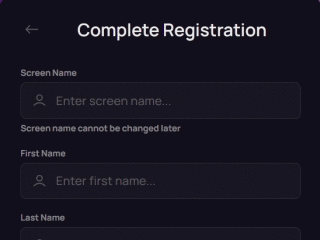One of the most popular posts on the forum this month was Nikolay Kanunikov's story about the two best months of his career: in February-March, he managed to get into closed high-stakes games on GG and won $1,300,000. In an interview with GipsyTeam, he told how the regular managed to avoid the blacklist for so long, why he thinks it's fair that there is no rakeback in high-stakes games, and what he plans to do next.
Hi! Tell us about yourself for everyone who doesn't read the blog .
My name is Nikolay Kanunikov, I have been playing poker professionally since 2017. For the last 5 years, I have been playing Omaha. I started with PLO5 and covered quite a lot of volume. I gradually moved up the stakes thanks to backing funds. For about a year now, I have been playing high limits on my own — up to PL2000 — in rooms and apps. I am constantly looking for the best conditions to play, 7 days a week without days off.

You share your latest results in a telegram channel, where screenshots almost always show GG tables. Is this your main room?
Yes, Nikita Yakovlev and I have been active in the media space lately. I play mostly on GG because there is more action there: it is easier to find tables for streaming and you can reach a larger audience. After closed games, I only play on GG.
I think I got invited to the VIP tables because I was losing big at PL5000 before they went private. Now I have a vested interest in beating PL2000, the highest stakes publicly available.
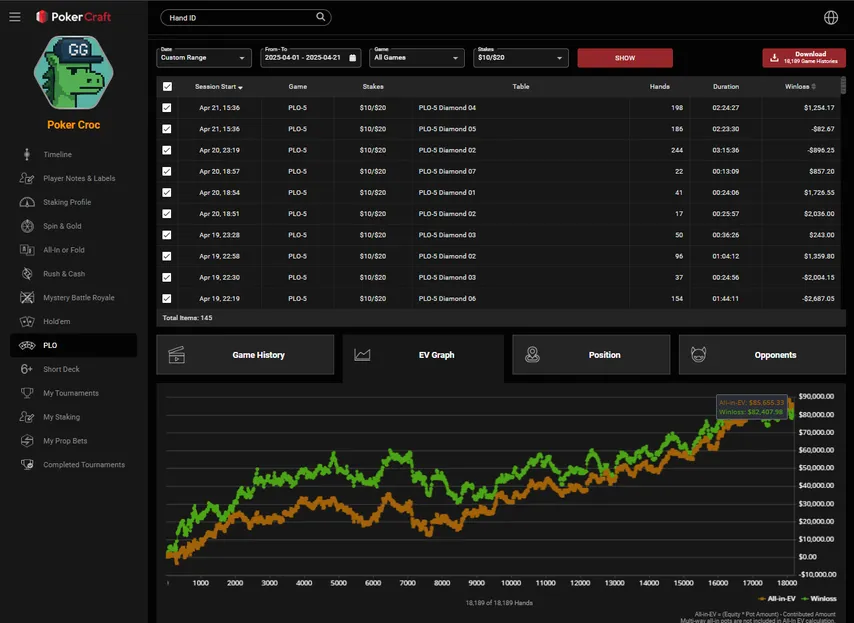
There's a big rake there.
Yes, everyone knows that the rake on GG is not small and it is not easy to beat the game. I somehow did not dare before. But now I have a good reserve of money, I am ready to fight to the death, to get into heads-ups. It is just a sporting and professional interest.
What about other rooms?
When you start playing above PL1000, it's hard to find a game in any room. And on GG, big traffic is a decisive factor.
Let's talk about closed games. How much do you have to lose at PL5000 to get an invite?
Good question, I don't know the answer. I think the administrators who select players at Exclusive Games have some kind of algorithm. They probably filter out players who have lost more than a certain amount.
I can't say exactly how much I lost, the deposit history for that period is no longer displayed. I think it was around $130,000-$140,000.
But I lost it at the VIP tables, which aren't there anymore. Maybe if I rolled $150,000 at PL2000 now, no one would invite me. Or maybe they're looking at the players from the past, and then they'll go after the ones playing the highest stakes now.
How does Exclusive Games select amateurs? They don't appear in the room as consistently as regulars.
I think they are known in some closed circle, or they participate in closed events, and go to series. There are quite a lot of people who have lost at open VIP tables.
Also, GG constantly hosts high stakes tournaments.
Yes, if a person consistently plays in Omaha tournaments for $1,000+, then why not invite him? Surely such statistics are not difficult to collect.
In your diary, you wrote that in two months of playing at Exclusive Tables you gave away $300,000 in rake and you consider it "fair earnings for GG". Would you say the same if you had won back at zero or minus?
I doubt it (laughs) . Of course, it's easy to say that when you've beaten the rake with a surplus over the long run.
By fair I mean they have managed to create a closed game that no other room has. It's the best game, whether you're a casual or a regular, better than anywhere else. Huge pots, lots of casuals, lots of action with the squid game that really increases your VPIP. It's all very good.
And, there are no bots yet.
Yes, fair play. I think there is more serious supervision from the security service at such limits. That's why I called such rake a fair income.
Yura Joke703 wrote on the forum that the appearance of closed high stakes games plunged him into depression. How did it affect you?
For me, it's exactly the opposite: after I got into this game, I got motivated to play more, become stronger and more public. I talked to friends who also had their access to high stakes blocked, everyone now wants to find their audience, become streamers, interest the room and get back to the tables.
You have to be either an amateur or a public figure to get invited – everyone understands that. Now professional players will come out of the shadows, try to popularize poker, to get noticed.
There is even a certain excitement in the fact that you don’t know whether you will be accepted or not. But you can try, make an effort, keep a blog, talk about your successes.
I think step by step expensive games will become closed, no matter if it's on GG or somewhere else. They will invite proven people with whom you want to play. So for me it's an additional motivation, not a dream-killer.
How many weak players are there in such a field? If you consider weak as someone you can beat without much trouble.
It's hard to say. It's hard to judge even the regulars, because as you can see from the graph, I had a wild re-up. When things are going so well, it's hard to honestly assess the level of the opponents.
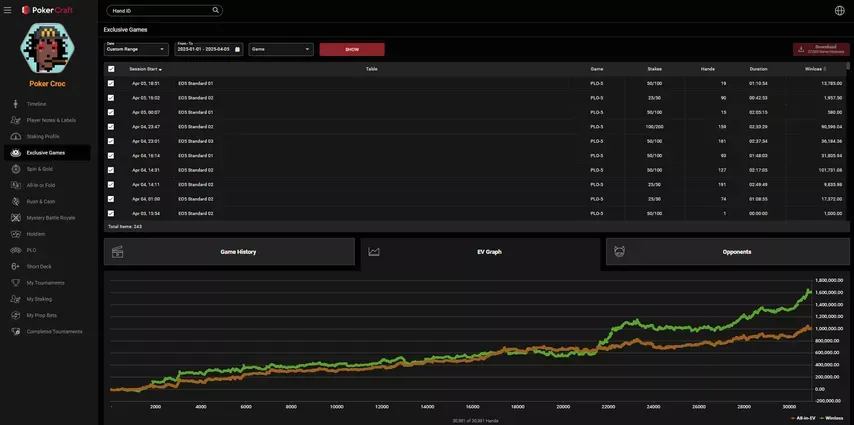
This winrate is luck, it would be lower on a longer distance. 30 evbb/100 after rake! That's a lot.
This is EV, but the actual win rate is even higher?
Yes. Who can compete with such luck at the table? No one. I would like to show some hands, but the whole selection only shows how well I was doing. In big pots I hit the boards perfectly, other players could do nothing. So the main secret is to enter such games when it works out.
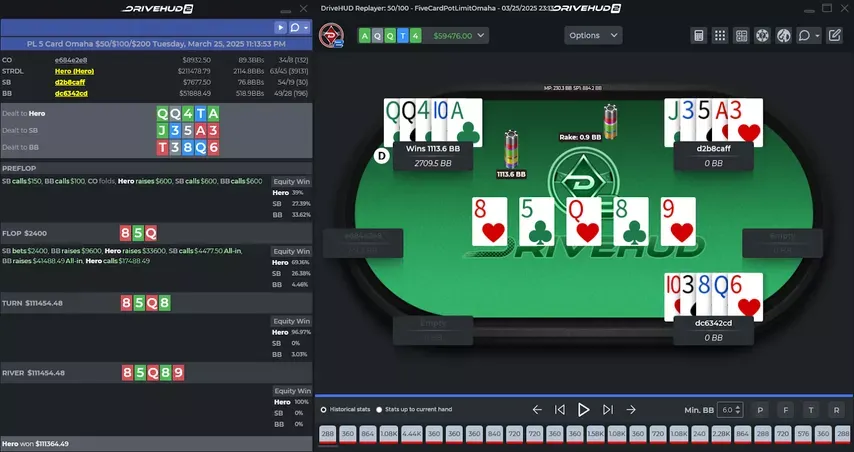
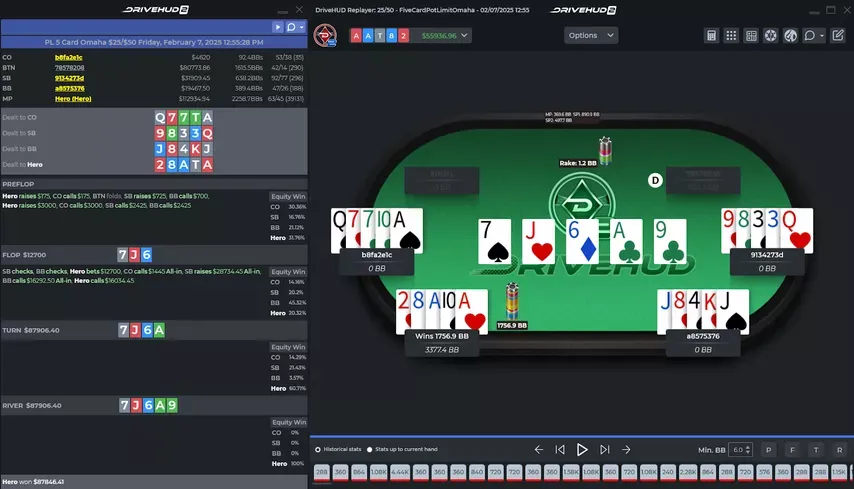
Over these two months you have won $1,300,000. How much is this above your average expectation at working limits?
If we take the last year, then 30-35 thousand hands is my distance for 1-1.5 months. In money, this is about $30,000-$40,000. It turns out that I won several years worth.
How would you rate the ratio of amateurs to regulars?
There are a lot of amateurs there. I think at least 50%.
I had a question about how pleasant the field is for a regular with zero rakeback, but it seems that it is no longer relevant. And what about skill? What stakes will a strong reg feel good in these lineups? If a person plays PL200 with 10bb/100, will he not get lost?
I have already mentioned Nikita Yakovlev, he is my coach and psychological mentor. We constantly analyze the game together, and we have formed the opinion that in five-card Omaha it is not so easy to beat an amateur with a lot of experience. And there are a lot of such amateurs.
If you find a good PL200 player, give him a bankroll and put him in closed games, there is an 80% chance he won't beat the amateurs. Because here the experience of playing in wild pots, with big sums in the middle of the table, is more valuable.
A dude who plays PL200 will simply bow out after a couple of bad beats in $50,000-$100,000 pots. He won’t be able to play his game. But an experienced amateur will feel confident like a fish in water. This is his field, he will eat such a regular.
The skill of "playing by solvers" is greatly devalued, and what is needed is experience of playing in deep stacks, with straddles, multiway all-ins. In all these non-standard situations you should feel confident and not be afraid of losing money. I strongly doubt that a PL200 regular will be able not to lose himself in such conditions or quickly adapt.
Can this happen to PL2000 regulars too?
Of course, but the probability is less, the pressure of money is not so strong.
Can you name the strongest opponents that played with you during this period?
It's hard to make such a top because of the upstreak. But even if I could, I still wouldn't name anyone. It would look like I'm publicly complaining about their presence. I don't want to set anyone up.
In the blog you mentioned that you wanted to stay in the closed game as long as possible, so you had to play unconventionally: straddles, no-look all-ins, make other minus actions. Was this your tactic from the very beginning?
I didn't have any clear, calculated decisions. I just wanted to play freely at the table, keep the action going, so that the fans would have fun playing.
I made a lot of losing decisions knowing they were losing. No-look all-ins are impossible to turn into profit. And also straddles, min-3bets, calls against no-look all-ins on any cards... It was all done to show how wild I can play. Amateurs like such moves.
Did it work? Did it feel like people were coming for this?
I think that's why I managed to hold out for two months. I immediately realized that I shouldn't take as a basis the approach of a template regular who will sit and show a dry GTO game. I was 100% sure that amateurs wouldn't like it.
About a month later I saw a player at the table who was just sitting and holding the minimum VPIP. 35% was required – that's exactly how much he entered the game. Almost immediately he was showered with so much negativity from all the participants... I'm sure such things immediately reach the host, who draws conclusions and quickly kicks them out.
By the way, my first sessions were minus. And during them I did nothing like that, did not accelerate the pots and only occasionally made min-3bets on random hands. And when I got into the plus, I started to break away. There are hands in which it is clear that nothing stopped me: it does not matter what hand and how minus it is, I just support the action and make the game dynamic.
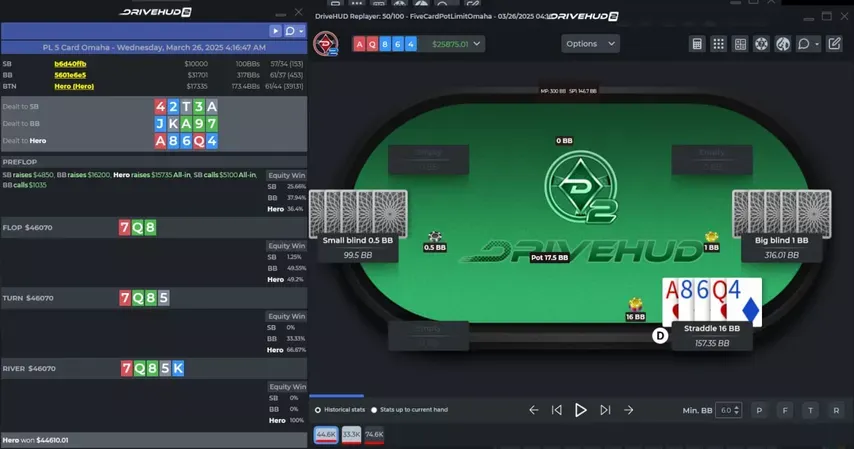
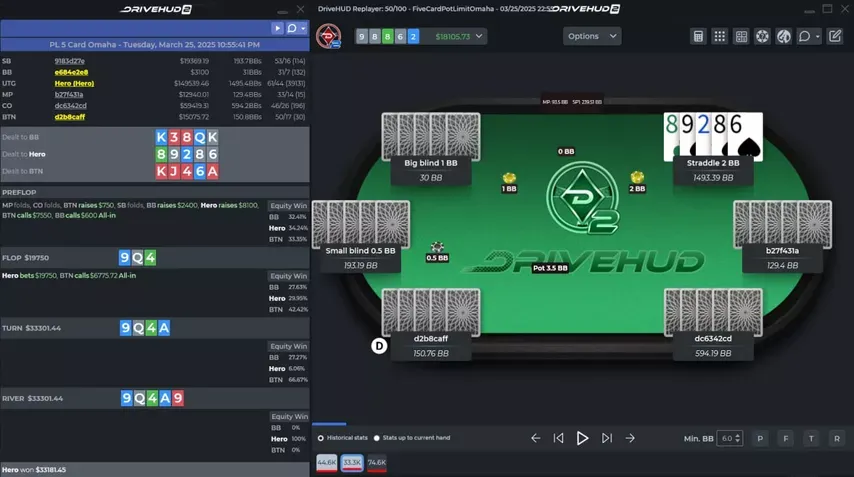
The more I won, the more recklessly I played. At some point, the fans even began to suspect that I was a dishonest player.
At one point I was banned from the chat for 30 days. One of the amateurs wrote something like "Are you a bot? I want to make sure you're a real person, let's talk on Skype or Telegram."
I try to communicate well with everyone at the tables, especially with the amateurs. They pay for the banquet, you can meet them halfway. I answered that I do not give my contacts, but I can write myself, and we will talk.
We got in touch, and he told some unrelated stories. That his friends are professional players, super-pros, that he has been losing lately. And he offered to play heads-up on another platform, ClubGG. I kindly declined, because I think it would be unfair to leave GG if we met there. And about being a bot – there is a security service, it oversees this, and the charges against me should be dropped. I even told him my real name (although I think it was a big mistake).
What country is he from?
From China. We communicated in English. Just in case, I decided to share the correspondence with my host and ask what to do in such situations. The host replied that GG policy prohibits sharing contacts in the chat. And that the security service banned both of us from the chat for a month.
I felt bad, because I wasn't the one who initiated it. But if there are rules, you have to follow them. I still can't write in the chat, I only use emoticons.
Back to crazy moves: You have a hand where you no-look all-in for 1,800bb that happened on March 25th. Was that right before the lockout?
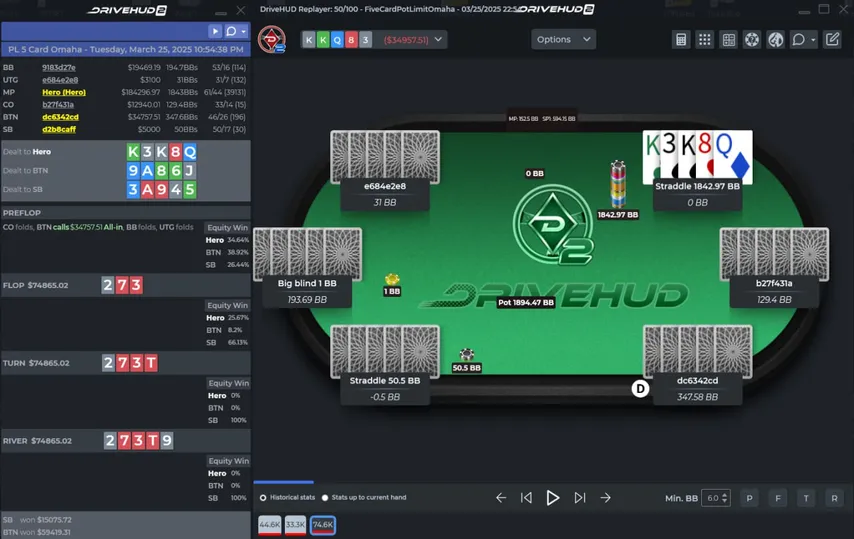
Yes, the further I went, the more relaxed I felt. I think that was the day when the lines on my chart started to seriously diverge, I was ready for a lot.
There's a wild ride, I have over 2,000bb. A new player sits down, unfamiliar with the dynamics of the last hours. I could just greet him with an all-in on any-five. And he didn't understand what was happening! The dynamics were such that other guys were pushing, without embarrassment, on questionable hands. There were a lot of all-ins. You could say it was a day of lotteries on the Exclusive tables in GG.
Okay, so it's clear with no-look all-ins. What about 10, 20, 50 blind straddles? Did you approach them strategically or did you also play freely?
If you are a professional player, you try to minimize mistakes one way or another, you adjust. So, yes, there were adjustments. They are mainly related to the fact that the game is played at a low SPR.
But it's still hard to say what to do. Decisions are made more based on experience. I always set straddles and tried to minimize losses by trial and error.
Due to intuition?
It's not exactly intuition. When you have a game, you make decisions based on experience. A solver won't help much, there are simply no solvers for calculating such situations now. And even if they exist, there is no point in bothering, buying, calculating and looking for optimal solutions when you, as a professional player, more or less understand where you are and distinguish negative actions from profitable ones.
Personally, I have worked very little in the solver in recent years. It gave me a base from which I played the distance. And it helps me overcome downstreaks: when the game collapses, big minuses, you need to tilt less. You can find the right lines in the solver and correct your thinking.
If you look at my hands, you can see that my game is very far from solving. Lots of skewed lines. But I know that this spot is more profitable to play exactly like this. I don't need to look at the solver. There are exploitable lines against specific opponents, when you make actions that will be 100% more profitable than solving ones.
I had a VPIP of 55 during this period. No other solver will have that much. And this is connected: you open more hands – more situations on the postflop, where you need to get your hands into the plus. You look for leaks of opponents, look at how to get super value.
Did you manage to learn something new?
Definitely. Yes, the distance is small, only 30,000 hands, but there were a lot of unusual situations. Great experience, which will help a lot in the future. First of all, to find plus spots at tables with amateurs.
I've already said both in the blog and in our conversation that a lot depends on the ability to beat non-professional players. You have to be able to adapt, learn to understand their game and beat them on all boards and with all the hands you have.
This is how we learned from a man who won a million that amateurs are hard to beat and the solving strategy doesn't work.
Yes, yes. In my blog I talked about how I tried to create a backing fund, and then I often heard complaints from professional players – like, a hot amateur sat down, took the whole table and left. You need to be able to play with such opponents. And this skill only comes through experience, after many years of participating in non-standard rinks. That's how you learn to understand what makes amateurs different and how to beat them.
It's hard in heads-ups with amateurs. I've had expensive 1v1 games where I could lose 20 buy-ins in a session. This really toughens you up, makes you think independently where solver thinking is not relevant at all.
Sounds interesting and scary.
It's not really scary, you just have to play. There are no easy ways to make big money in Omaha. Everyone will suffer anyway.
During the closed games, did you see how a person crumbles under the pressure of money and action? Were you able to take advantage of this?
Not really, everyone plays boldly. Even if we take the example of a guy who held a minimum VPIP: it seemed that he was tight, maybe money was pressing. After a couple of days, he became more relaxed, VPIP grew. Maybe it's a matter of adjustments, or maybe the host explained to him that he needs to be more active in order not to lose access.
But I don’t remember directly exploiting someone specific, for example, through overfolds.
Is there a high turnover of players at these limits? Do new faces often appear and old ones disappear?
Not among the regulars. In these two months I have seen only one person who disappeared. And it is not a fact that he was kicked out. Maybe he was on vacation. I remember him once writing in the chat that he had a plane or a train, that he was checking into a hotel, and so on.
And among amateurs, yes, new players are constantly appearing, the traffic is active. It seems that the algorithm for selecting new players has started to work better.
When I was already playing, I even received an invitation from another host. Apparently, he didn't know that I was already participating. And after the suspension, I contacted him, but, of course, I heard that if you were kicked out, you can't come back.
Are they hinting at the possibility of "cleaning up their reputation" and returning?
No. I asked what I needed to do to get into those games again, but no clear answer or recommendations were given. In general, everything is logical: the game should go on without people who irritate opponents. Amateurs should be happy, and regulars should positively cover the game in the public arena.
Unless you're a big-timer who loses big and a regular who talks about this cool game, you're just out of place.
I don't like the term "reputation wash", though. I don't feel like my reputation is tarnished in any way. I'm an honest player, and the security service has no questions about me.
There were people who wrote to me: "You are now on the blacklist, and no one will let you in a second time because of your big wins." I don't agree with that. Firstly, big pots are advertising in themselves. Secondly, I covered my path on the forum, shared my story, it's a super-advertisement for exclusive games. For regulars, it's a huge motivation to get into these games. The game is so weak there that there will most likely be even plus amateurs who will manage to make a lot of money.
Can the organizers remove an amateur, even if he is active and enthusiastic?
I think it's possible. If you're toxic, your presence repels others, if you undermine GG's authority, then people won't want to play with you. It's not profitable for the room to give you access. The game should be like home games, so that amateurs don't complain. They came to relax, to participate in something interesting.
Undermine GG's authority?
Throw mud at them, talk about the unfairness or injustice of these games. By the way, about my post on the forum. I don't think I was kicked out specifically for winning. Rather, my opponents saw that I was earning an unrealistically large amount, and complained... They kicked me out because of the complaints.
If I were a regular player who supports the action and doesn't piss people off with wins, I might stick around. I don't think the manager looks at my account and says "yeah, he won a ton, let's kick him out." No. Rather, it's not the money that's more important to them, but how the player influences the atmosphere at the tables.
Maybe if I played 10 evbb/100, I would sit there for years. If only the opponents didn't start to run away.
Could you write to the host, complain about someone and thus affect access to the game?
No, it wouldn't have made any difference. It's one thing when amateurs complain, another when I do.
So your host didn't think you were an amateur? Do they have some kind of distinction as to who to listen to and who not to?
I think after 2-3 cashouts I was definitely registered. After the first warning I played for about a month, that's quite a long time. It was clear that many amateurs wanted to play with me, they liked it, they actively sat down in heads-up.
So, it turns out that the offended minority kicked them out?
You could say that. Or maybe everyone I played with didn't like it anymore because they lost pretty badly.
Do GG Ambassadors' opinions influence who gets invited or not invited?
I don't think so. It seems to me that the room primarily listens to amateurs. Maybe an ambassador can quickly figure out with an experienced eye who is an amateur and who is a reg, and pass this information on to the host.
Direct question: can an ambassador simply ask to revoke access to a closed game from a specific player? If the fans don't complain much?
Unlikely. As far as I understand, a collective complaint is needed. One person certainly doesn't solve anything.
We've discussed your great success in detail, but I'd like to touch on the other side of your career. In your blog, you wrote about two deep makeovers: $80,000 and $300,000. What helped you cope with these difficult periods?
There is a big difference between these two cases. The 80 thousand make-up was the biggest at that time and very difficult. I had no idea that it was possible to play in the minus for so long, about a year and a half. I had a safety cushion, it would have been enough for another year. But I didn’t understand whether I could get out of the hole. I managed to overcome the crisis thanks to training with Nikita and psychological attitudes. Plus, the backer selected the best fields. And step by step I got out.
The second time, which is for $300,000, was easier. I already considered myself a professional, played up to PL5000 and understood that I could lose big amounts. I had a very serious cushion behind me, I didn’t have to worry about money at all.


I tried to stick to my own strategy, analyzed my hands, worked with a trainer. I understood that this is how I can get out of a streak and continued to work.
The hardest thing in this situation is the heavy emotions, the despair. When you are not sure that you can beat the field and remain a professional player. There is a feeling that this is the bottom – now you will drown and never get out. These are the hardest emotions to cope with.
How to do this?
First of all, analyze the game and understand that you can be responsible for your actions. If you open yesterday's hand, look and say: "damn, I played badly here, I shouldn't have done that", then you're just rolling somewhere into the abyss. But if you open it and say: "okay, I did everything right here, but in this hand I need to fix something" and try to figure out how to avoid making mistakes again, then you'll go up.
You can't forgive yourself for any mistakes. This will greatly affect your win rate. When you're in the minus, you need to maximize your win rate to get out of the hole faster.
You said that a regular can get an invitation due to media exposure. Do you know of any such examples, not counting ambassadors?
Not really. Of course, I know about Minton, Inner, I've been following their streams since the dawn of my career. Denis Chufarin also actively played Omaha.
Sometimes it's hard to tell who's a media player because in exclusive games you can change your nickname. And if you do, your previous nicknames aren't shown like they are on regular tables...
Media people usually don't hide.
I only remember one famous person who didn't hide his real name – Nikolay Voskoboinikov. He played very high, he was at PL40000. I saw how he could lose up to $300,000 in an evening, and at the same time he always remained very polite. Even after such a session he would write "okay guys, have a good night, nice game, goodbye".
Do you think all participants in exclusive games play for real money?
I don't have that information, of course, but I've never had any doubts that Misha Inner or Minton play for real money. They've been playing professionally for a long time. I think they have the bankroll or backing options to play in games like that.
I don't think that "playing for fun" is interesting for the room. Such things can undermine the image and create the impression that GG wants to skin amateurs. After that, the reputation will not be restored. Now the room earns so much on rake that the risk is not justified.
What to do if suddenly tomorrow the ambassador does not want or cannot play for his team?
I think there are a lot of people who want to get to the tables, there will be no problems with finding replacements. I am sure there is a queue of people who want to.
In two months you won a sum that could provide for a person for the rest of his life. Did this success affect your plans for the future?
The win greatly increased motivation. There was a desire to go public, to cover my activities more, to do streaming. Nikita and I are actively holding various events in the Omaha Club Telegram channel, developing the community. Now we have launched a distribution of cool NFTs for people who watch our streams. There are big plans for further development. We want to gather a really big online audience.
I got a new vector for career development. I have a sporting interest in beating PL2000. I didn't really want to accomplish such feats before. Now I want to dispel my own doubts.
Will we see you soon in live poker games?
Definitely. In the near future we plan to go to Macau, and then slowly to some popular series. I have very little experience offline, it is difficult to play. I have poor orientation at the table, I can’t look at these two-color cards, I can’t count the chips. For me, this is a big burden, because I do not have the same intelligence as many professional players. In these situations, my brain boils.
Will you be playing cash in Macau?
Yes. We've heard that they play expensive Omaha there. I want to try it, see what it looks like, what kind of field it is. And create content for the blog, show it to the guys.
Has anything changed in your personal plans and quality of life?
Nothing has changed at all. I'm not in a situation where I had nothing and suddenly won the lottery. I've earned enough money in my career, and this amount hasn't significantly affected my life.
Thanks for the frank conversation! I hope your upstreak continues.
Thank you. Good luck to everyone!

















